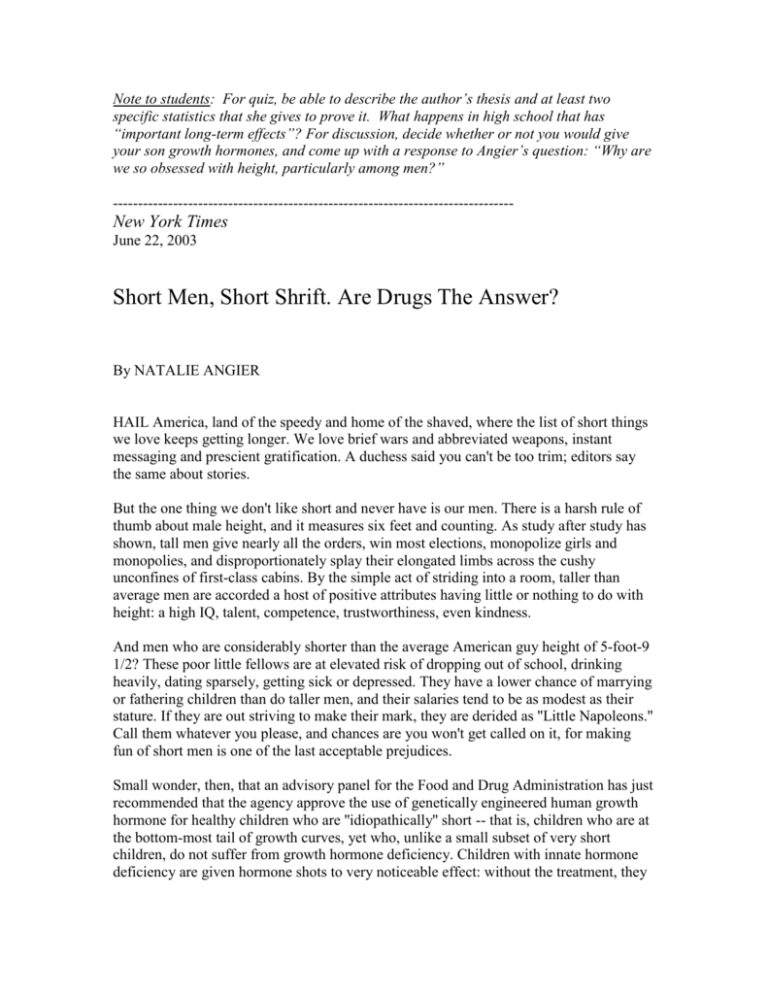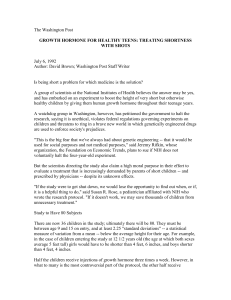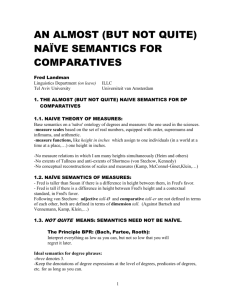Short Men, Short Shrift
advertisement

Note to students: For quiz, be able to describe the author’s thesis and at least two specific statistics that she gives to prove it. What happens in high school that has “important long-term effects”? For discussion, decide whether or not you would give your son growth hormones, and come up with a response to Angier’s question: “Why are we so obsessed with height, particularly among men?” -------------------------------------------------------------------------------- New York Times June 22, 2003 Short Men, Short Shrift. Are Drugs The Answer? By NATALIE ANGIER HAIL America, land of the speedy and home of the shaved, where the list of short things we love keeps getting longer. We love brief wars and abbreviated weapons, instant messaging and prescient gratification. A duchess said you can't be too trim; editors say the same about stories. But the one thing we don't like short and never have is our men. There is a harsh rule of thumb about male height, and it measures six feet and counting. As study after study has shown, tall men give nearly all the orders, win most elections, monopolize girls and monopolies, and disproportionately splay their elongated limbs across the cushy unconfines of first-class cabins. By the simple act of striding into a room, taller than average men are accorded a host of positive attributes having little or nothing to do with height: a high IQ, talent, competence, trustworthiness, even kindness. And men who are considerably shorter than the average American guy height of 5-foot-9 1/2? These poor little fellows are at elevated risk of dropping out of school, drinking heavily, dating sparsely, getting sick or depressed. They have a lower chance of marrying or fathering children than do taller men, and their salaries tend to be as modest as their stature. If they are out striving to make their mark, they are derided as ''Little Napoleons.'' Call them whatever you please, and chances are you won't get called on it, for making fun of short men is one of the last acceptable prejudices. Small wonder, then, that an advisory panel for the Food and Drug Administration has just recommended that the agency approve the use of genetically engineered human growth hormone for healthy children who are ''idiopathically'' short -- that is, children who are at the bottom-most tail of growth curves, yet who, unlike a small subset of very short children, do not suffer from growth hormone deficiency. Children with innate hormone deficiency are given hormone shots to very noticeable effect: without the treatment, they would be true midgets, perhaps under four feet tall as adults; with the shots, they are brought up to low-normal heights. Yet ever since the biotechnology business began synthesizing potentially limitless supplies of the drug 20 years ago, doctors have been using it in off-label fashion to treat children who for unknown reasons are quite short, maybe in the lowest three percentiles of their age group. The results have been what might be called whelming, in some cases adding as much as 3 1/2 inches to a person's projected final height, in others maybe no more than an inch and change. Still, the scientists on the advisory panel were persuaded enough by the hormone's relative safety and measurable if modest effects to recommend all-around treatment for the seriously subcompact among us. Whether the F.D.A. takes the advice will not be known until later this summer, if even then. Yet already the moral trichotillomania has begun. Why are we so obsessed with height, particularly among men? Women, after all, often like to be called petite, though women in law, business and other high-powered professions who are below the female average height of 5-foot-5 claim that their diminutive stature makes it hard for them to be taken seriously. ARE we really willing to subject our kids to buttock or thigh injections three to six times a week, year after year, just so that the local Dudley Dursley will taunt them about their big ears and good grades, rather than their stature? Aren't people like the Dutch, among the tallest populations on earth, with an average male height of over six feet, really the human equivalents of S.U.V.'s, barreling heedlessly along, sucking up more than their fair share of precious resources like oxygen? And who will pay for the treatments anyway, which can run $20,000 a year? ''If the F.D.A. approves the drug for wider use, insurance companies won't have to pay for it, but it may be harder for them to say no,'' said John D. Lantos, associate director of the MacLean Center for Clinical Medical Ethics at the University of Chicago. ''Then the cost of the treatment ends up being collectively subsidized, and we have to wonder, is this the best way to spend limited health care dollars?'' Can't we instead tell our short child, listen, Brunelleschi, the founding architect of the Italian Renaissance, was short, and ugly too; Picasso was only 5-foot-4 and Voltaire an inch beneath him; and one way to stand tall is to do stand-up? ''There's some interesting data that short men are overrepresented among comedians,'' said Henry B. Biller, a co-author of ''Stature and Stigma: The Biopsychosocial Development of Short Males.'' To which this 5-foot-3 1/2-inch woman can only sigh, Ha! The data in favor of lofty stature is too mountainous to ignore. For every extra inch of longitude, a man adds 2 percent to his yearly income. Maybe 60 percent of American chief executives are six feet or taller, and according to Nancy Etcoff of Harvard Medical School, author of ''Survival of the Prettiest,'' only 3 percent are 5-foot-7 or shorter. American presidents are also big offenders, a tradition begun by George Washington, who at 6-foot-2 loomed by at least eight inches over most of his contemporaries; and since then, nearly half of our presidents have been of Dutchly dimensions. Famously, the taller of two presidential candidates nearly always wins the election. Carter beat the taller Ford in 1976, but couldn't dodge Reagan's three-inch advantage four years later. Tall men certainly know the allure of their height. In the personals of a recent issue of New York magazine, for example, fully half of the men seeking women described themselves as tall. Women, by contrast, if they mentioned their height at all, tended to give an exact measurement, perhaps to discourage men below that mark from writing in. Dr. Etcoff notes that in one study of married couples, less than one-half of one percent of the women were taller than their husbands. Yet ultimately, height may be as much a matter of attitude as of altitude. In one recent study, Andrew Postlewaite, professor of economics at the University of Pennsylvania, and his colleagues Nicola Persico and Dan Silverman, determined that what really counts for a man's professional success in life, heightwise, is not his adult height, but the height he was in high school. ''If you take two people who were 5-foot-6 in high school, and one grew to 5-foot-7 and the other to 6-foot-1,'' said Dr. Postlewaite, ''there would be no predictive difference in their adult income.'' Whether that is because one's physique in those critical years of puberty sets the thermostat of self-confidence and swagger, or whether short teenagers, who tend to avoid sports and other group activities, fail to master the nuances of team spirit considered crucial throughout most of the business world, Dr. Postlewaite cannot yet say. ''Clearly something happens in high school that has important long-term effects,'' he said. Maybe you can't go home again, but with homeroom, you can never leave. Copyright 2006 The New York Times Company











